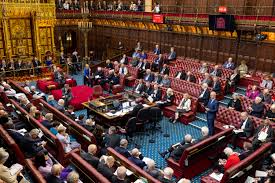
UK Parliament Debates Immigration Reform Bill A Critical Turning Point in National Policy
The UK Parliament has embarked on a pivotal debate surrounding a newly proposed Immigration Reform Bill, setting the stage for a profound shift in the nation’s immigration landscape. Introduced in early July 2025, the bill advocates sweeping changes to visa categories, border controls, and integration frameworks. This legislative drive stems from public calls for a system that is both tougher on irregular migration and fairer for skilled professionals and families. But as lawmakers clash over the bill’s contents, its fate or failure will have lasting consequences for the UK’s economic future and social cohesion.
At the core of this bill is a reimagined points based system, intended to attract workers with sought after qualifications and experience. It proposes raising the threshold for points earned via English language proficiency, job offers with national pay standards, and sector specific skills. Concurrently, it intends to phase out low skilled work visas, especially in industries such as hospitality, agriculture, and caregiving. Supporters argue this change will streamline migration toward sectors that drive growth, while critics contend it will create labor shortages crucial to the functioning of small communities and service based economies. The agricultural sector, in particular, has voiced concerns warned it may lack enough seasonal laborers to sustain harvest yields.
Equally contentious is the bill’s emphasis on tightening border enforcement and illegal entry penalties. It aims to accelerate processing for asylum seekers deemed unlikely to secure refugee status, and to introduce mandatory detention zones at ports of entry. Border officials await expanded powers for digital screening and rejection of applications pre lodged online. Advocates describe the measures as necessary to discourage unsafe crossings and confront organized smuggling. However, humane rights groups warn that such policies risk criminalizing vulnerable individuals fleeing persecution. They call for safeguards to protect victims of trafficking and emphasize the importance of timely access to legal representation.
The bill also unveils a controversial strategy to relocate asylum seekers to third countries while their claims are processed. Modeled loosely on arrangements seen in Australia, it proposes sending migrants to states with pre existing resettlement agreements during evaluation. If their claims are rejected within a fixed period, return flights would be enforced. At present, discourses around this component have sparked debate over the legality and diplomatic feasibility of outsourcing responsibility. Critics argue the plan may violate international treaties and lead to prolonged limbo for applicants. Supporters maintain that the move could prevent systemic backlog and reduce the financial burden on public services.
But it isn't only border policy provoking political fire. The bill includes a raft of integration measures for those who qualify to remain. Successful applicants would undergo mandatory English proficiency tests at middle high levels, complete orientation courses explaining civic duties and UK laws, and secure livelihoods with minimum income criteria before being granted indefinite leave. Advocates assert these provisions will foster smoother inclusion and economic self reliance. Skeptics counter that overregulation might hamper access to essential services and drive desperate individuals into informal, precarious work.
During parliamentary committee reviews, lawmakers also turned their focus to family unification provisions. The bill proposes tighter conditions for dependents joining settled migrants, including income certification, housing inspections, and stronger public fund restrictions. Some legislators, including members from both major parties, argue these rules are essential to curb chain migration. Nevertheless, campaigners for children’s rights warn it could separate families and set harmful precedents for mental well being. Tales of elderly parents denied visas or children unable to reunite with siblings have stirred emotional responses during deliberations.
Behind closed doors, business lobbies have made their views heard. Tech firms and NHS providers are pressing for flexible visa routes and more generous sponsorship rights highlighting that existing visa caps have impeded filling vacancies in high demand occupations. They stress that tailored entry schemes, fast track residency processes for top end talent, and more lenient renewal protocols are required to sustain innovation and frontline services. In contrast, some labour rights and community groups argue the bill should also include worker protections and anti exploitation clauses, ensuring employers don’t misuse sponsored visas to underpay migrant labor a concern at the heart of many recent tribunal cases.
The parliamentary debate is expected to proceed over coming weeks, with cross party commissions proposed to scrutinize amendments. if ministers will relent and draft a compromise remains unclear. Prime Ministerial spokespersons have hinted at gradual moderation of some clauses to ensure industry needs are met, while pledging that enforcement measures and “breaking the back of illegal migration” remain central tenets. Labour and Liberal Democrat spokespeople have expressed willingness to support a reworked version should it balance control with fairness.
As the debate intensifies, public opinion surveys show a divided nation. Roughly half of respondents believe immigration is too high, while a comparable share supports legal migration for skilled roles. Importantly, many endorse humanitarian obligations calling for dignified treatment of asylum seekers even as they favor stricter border protections. The final form of the Immigration Reform Bill will ultimately signal if Parliament responds to hardline caution, humanitarian calls, or an economic blueprint for balanced global integration.
In summary, the UK’s Immigration Reform Bill marks a watershed in migration policy. With far reaching changes to labor entry, asylum processing, family unification, and integration, it is set to recalibrate the nation’s demographic and economic trajectory. Parliament now faces a critical task to craft a system that upholds security and service viability without tearing communities or breaching international promise. Success will require deft amendments and political consensus. Failure risks economic paralysis, legal quagmires, and public mistrust. In the months ahead, all eyes will be on Westminster to see if this reform marks progress or regress in the UK’s approach to migration.
Related Post
Popular News
Subscribe To Our Newsletter
No spam, notifications only about new products, updates.
















